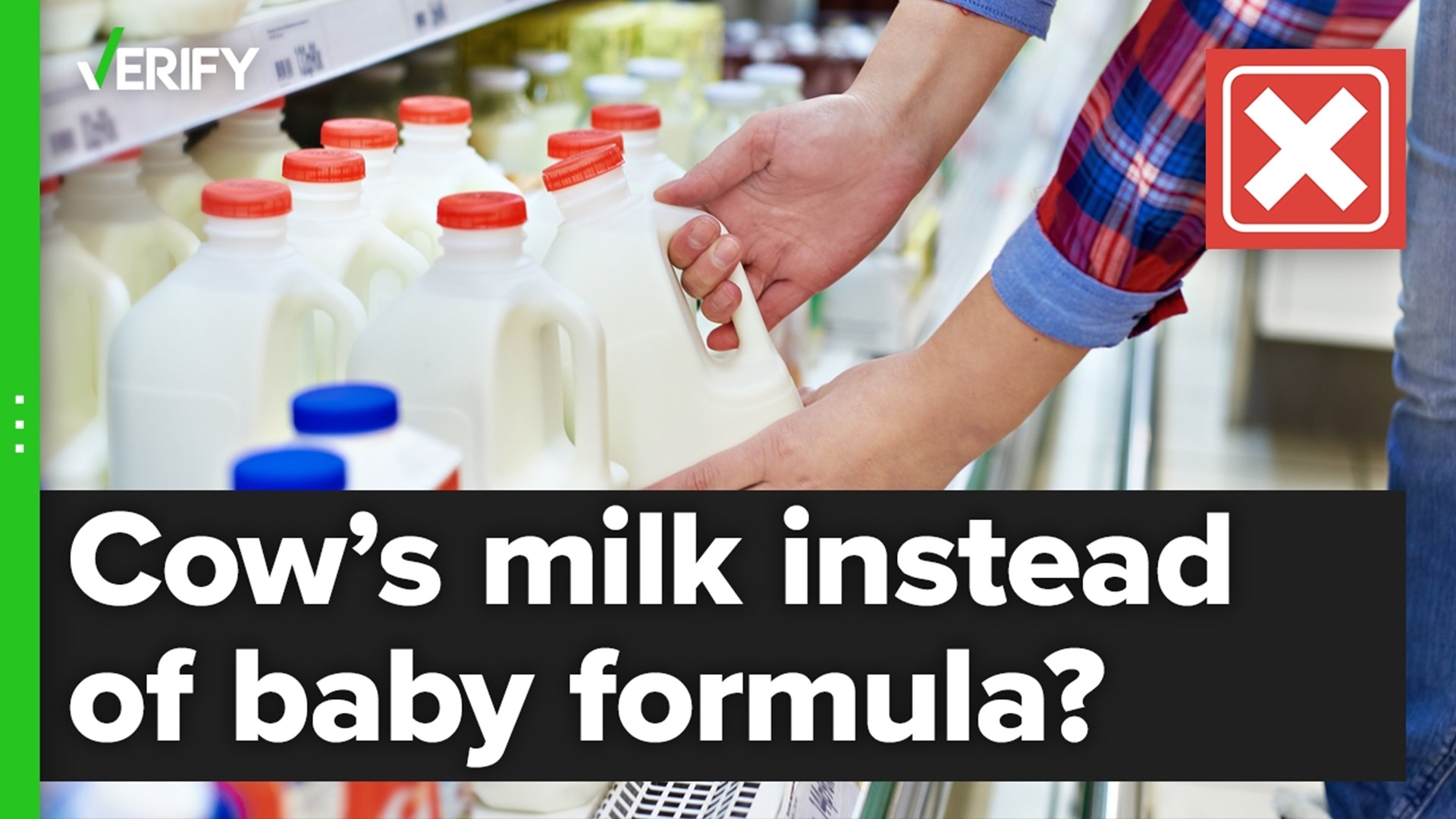As the monthslong shortage of baby formula continues to impact U.S. families, questions about other infant feeding options have spiked.
President Joe Biden’s administration has announced steps aimed at easing the shortage, including reopening the largest formula manufacturing plant in the country and increasing imports from overseas. Though relief might be on the way, many parents are still desperately searching for alternatives right now as their trusted baby formula brands remain out of stock.
Some tweets suggesting parents can now feed their babies 6 months or older cow’s milk are leading to confusion. That’s because cow’s milk typically isn’t recommended for babies until they are 1 year old. VERIFY viewer Jean also texted the team to ask if parents can feed their babies cow’s milk.
THE QUESTION
Should parents feed cow’s milk to babies who are 6 to 12 months old?
THE SOURCES
- Centers for Disease Control and Prevention (CDC)
- The American Academy of Pediatrics (AAP)
- Rachel Dawkins, M.D., medical director of the pediatric and adolescent medicine clinics at Johns Hopkins All Children’s Hospital
- Andrew Bremer, M.D., chief of the pediatric growth and nutrition branch at the National Institute of Child Health and Human Development
- Ilan Shapiro, M.D., pediatrician and chief health correspondent and medical affairs officer at AltaMed Health Services
- Steven Abrams, M.D., professor of pediatrics at University of Texas Dell Medical School and chair of American Academy of Pediatrics’ Committee on Nutrition
- U.S. Department of Health and Human Services (HHS)
THE ANSWER
No, parents shouldn’t feed cow’s milk to babies 6 to 12 months old, except in an emergency when every other option has been exhausted.
WHAT WE FOUND
The Centers for Disease Control and Prevention (CDC) and the American Academy of Pediatrics recommend that babies be introduced to cow’s milk at 12 months old, but not before then and never as the child’s main source of nutrients.
Cow’s milk has too many proteins and minerals for a baby’s kidneys to handle and does not have enough necessary nutrients, the CDC says. It could also put the baby at risk of intestinal bleeding.
Rachel Dawkins, M.D., a pediatrician at Johns Hopkins All Children’s Hospital, agrees.
“It’s not safe to feed babies whole milk or cow’s milk before the age of 1 really for a couple of reasons,” she said. “Cow’s milk does not provide enough iron for babies and it can cause them to become anemic. And it also has a lot of different solutes like protein and different things that the kidneys don't process very well in infants. So we don't recommend cow's milk for kids under 1 year old.”
During a baby’s first six months of life, medical experts recommend either human milk or baby formula if human milk isn’t available, Andrew Bremer, M.D., with the National Institute of Child Health and Human Development, told VERIFY.
Parents may be able to feed cow’s milk to some babies between 6 and 12 months old if other formula alternatives are unavailable during the ongoing shortage, but this shouldn’t be a long-term solution.
Steven Abrams, M.D., professor of pediatrics at University of Texas Dell Medical School and chair of the American Academy of Pediatrics (AAP) Committee on Nutrition, says on the AAP’s parenting website that cow’s milk may be an option for children older than 6 months who are usually on regular formula if other alternatives aren’t available. This does not apply to babies who need specialty formula products for allergies or have other special health needs.
“In a pinch, you could feed them whole cow's milk for a brief period of time until the shortage is better. This is not ideal and should not become routine. However, it is a better option than diluting formula or making homemade formula,” Abrams said.
Parents shouldn’t immediately jump to giving their baby cow’s milk, though, Bremer said. First, they should call their OBGYN or pediatrician to see if they have in-office baby formula samples, or ask if they can suggest a formula that may be more readily available and is nutritionally similar to their baby’s typical formula, according to guidance from the U.S. Department of Health and Human Services (HHS).
Generic formula brands from a grocery store or pharmacy are “equally effective and safe to use,” pediatrician Ilan Shapiro, M.D., said. Shapiro also suggested breast milk banks, where other parents are giving away their breast milk, as an option if the baby’s formula brand isn’t available.
Whole milk is a better option in an emergency situation if the baby is closer to 1 year old, Dawkins said. But it shouldn’t be the child’s only source of nutrition due to the risk of anemia.
The AAP, HHS and other medical experts warn against diluting formula with water or making baby formula at home, as some on social media have suggested. Homemade baby formula is not safe and does not meet babies’ nutritional needs. Infant deaths have been reported from use of some homemade formulas, according to the AAP.
Goat’s milk is not approved as an alternative feeding option for babies in the U.S. However, there are some goat milk-based baby formulas in other countries that the U.S. Food and Drug Administration (FDA) may consider for accelerated import approval, Abrams said.
Additionally, some plant-based milks like almond milk are not recommended as baby formula alternatives, as they don’t have enough protein or healthy fats that babies need for brain development.












